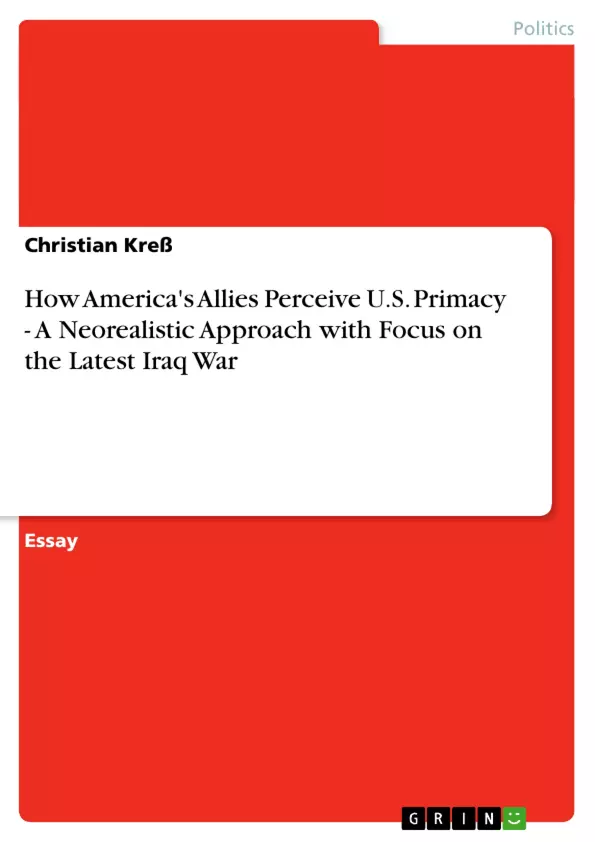Nowadays, the United States of America is undoubtedly the most powerful country in the international arena. Its primacy in the world is chiefly based on its extraordinarily large military capabilities and strong economy. U.S. leaders and citizens consider the U.S. primacy to be a force for good, which is intrinsic to American exceptionalism, i.e. the idea that the USA can and should help make the world a better place. As former president William Clinton put it: the United States is a “beacon of hope to peoples around the world,” and is “indispensable to the forging of stable political relations.” However, there are plenty of other countries whose leaders and citizens are not pleased with U.S. primacy, some of them even considering it to be dangerous. Concerns of other states have grown since George W. Bush has become president who – by making use of U.S. primacy – has been embarking on a more unilateral foreign policy than his predecessor has. Even close allies have become more worried about the United States’ influence in world politics. In November 2003, some months after the latest U.S. invasion of Iraq, a poll conducted by BBC revealed that 53 percent of Europeans considered the United States to have a negative role on peace in the world. This essay illustrates why even the United States’ allies have reason to fear and actually do fear U.S. primacy. This thesis is going to be substantiated by analyzing in detail the opposition of Germany and France, both close allies of the United States, to George W. Bush’s plan to invade Iraq during the time that lead up to the invasion in March 2003. Initially, though, this essay is going to shed light on what makes the U.S. being the independent strongest actor in world politics and how its unilateralism can be made sense of in the context of the theory of structural realism, as outlined by Kenneth N. Waltz.
Inhaltsverzeichnis (Table of Contents)
- The United States of America holds a position of primacy in the world
- War
- This thesis is going to be substantiated by analyzing in detail the opposition of Germany and France, both close allies of the United States, to George W. Bush's plan to invade Iraq during the time that lead up to the invasion in March 2003.
- The United States of America holds a position of primacy in the world
Zielsetzung und Themenschwerpunkte (Objectives and Key Themes)
This essay aims to analyze the reasons why even close allies of the United States fear U.S. primacy, particularly focusing on the opposition of Germany and France to the 2003 invasion of Iraq. It examines the concept of U.S. primacy and how it is perceived by its allies in the context of neorealism.
- U.S. Primacy and its Influence
- Neorealist Perspective on International Relations
- Opposition to U.S. Unilateralism
- The Case of the Iraq War (2003)
- The Role of Allies in International Politics
Zusammenfassung der Kapitel (Chapter Summaries)
- The first chapter introduces the concept of U.S. primacy and its origins, outlining the key factors contributing to its dominance, including economic strength, military supremacy, and cultural influence. It also discusses the concept of unilateralism and its implications for international relations.
- The second chapter delves into the contemporary context of U.S. primacy and the growing concerns of other states, particularly since the presidency of George W. Bush. It highlights instances of U.S. unilateralism and the negative perceptions it has fostered among allies.
- The third chapter, which is not summarized here, focuses on the specific case study of the opposition to the 2003 Iraq War, analyzing the motivations and perspectives of Germany and France, two close allies of the United States, in detail. This analysis aims to provide concrete evidence for the fears and concerns surrounding U.S. primacy.
Schlüsselwörter (Keywords)
This essay focuses on the concepts of U.S. primacy, neorealism, unilateralism, and the Iraq War (2003). It examines the perceptions of U.S. allies regarding the country's dominant position in international relations and the implications of its foreign policy actions. Key themes include international relations theory, power dynamics, and the role of alliances in global politics. The case study of the Iraq War illustrates the tensions and conflicts that arise from U.S. primacy and its impact on relations with its allies.
Frequently Asked Questions
What is "U.S. Primacy"?
It refers to the United States' position as the most powerful actor in the world, based on military supremacy, economic strength, and cultural influence.
How does Neorealism explain U.S. foreign policy?
Neorealism (structural realism) suggests that in an anarchic international system, the strongest power often acts unilaterally to ensure its interests and security.
Why did Germany and France oppose the 2003 Iraq War?
The essay analyzes their opposition as a reaction to U.S. unilateralism and the perceived danger of uncontrolled U.S. primacy affecting global peace.
What is "American Exceptionalism"?
The belief that the USA is inherently different and has a unique mission to spread democracy and hope around the world.
How do allies perceive the U.S. role in world peace?
According to the text, a 2003 poll showed that 53% of Europeans considered the U.S. to have a negative role on world peace following the invasion of Iraq.
- Quote paper
- Christian Kreß (Author), 2007, How America's Allies Perceive U.S. Primacy - A Neorealistic Approach with Focus on the Latest Iraq War, Munich, GRIN Verlag, https://www.grin.com/document/79385



